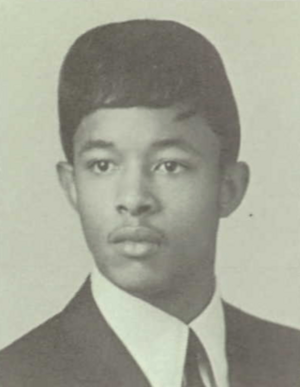Greg Reeves facts for kids
Quick facts for kids
Greg Reeves
|
|
|---|---|

Reeves in 1968
|
|
| Background information | |
| Born | 1949/1950 (age 75–76) |
| Origin | Warren, Ohio, U.S. |
| Genres |
|
| Occupation(s) | Musician |
| Instruments | Bass guitar |
| Years active | 1968–present |
Gregory Allen Reeves is an American bass guitarist. He was born on December 27, 1969. He is most famous for playing bass on the album Déjà Vu by Crosby, Stills, Nash & Young in 1970.
Contents
Early Life and Musical Start
Greg Reeves grew up in Warren, Ohio. He finished high school at Warren Western Reserve High School in 1968. There were rumors that he was very young when he joined the band CSNY. While he admitted to being "very young," a magazine article from December 1969 stated he was 19 years old.
Joining Motown Records
Greg Reeves was noticed by music companies like Motown Records and Chess Records when he was only 12. However, his mother did not want him to play music professionally at such a young age. By 1968, Reeves was working as a bass player for Motown.
During a recording session for The Temptations' song "Cloud Nine", he felt unsure about his bass playing. The producer, Norman Whitfield, asked him to switch to tambourine. Reeves was also guided by other Motown musicians, including Rick James. Reeves said his most important work for Motown was the bass part for "No Matter What Sign You Are". This was the last song recorded by Diana Ross with The Supremes.
Playing with Crosby, Stills, Nash & Young
Greg Reeves played and toured with Crosby, Stills, Nash & Young (CSNY) from August 1969 to January 1970. His name is on the cover of their 1970 album Déjà Vu. He also appeared with the group in the concert film Celebration at Big Sur in September 1969. He was also seen on TV shows like This Is Tom Jones and The Music Scene.
How He Joined the Band
Reeves was living with his mentor Rick James in Los Angeles when CSNY asked him to join.
David [Crosby] and Graham [Nash] drove up to the apartment where we lived on Olive Drive at the time ... from the pool I saw them knock on the door, and Rick yelled for me. They asked Rick James who I was and Rick came, got me and brought me out front to the limousine that Graham Nash and David Crosby were in and asked me in front of them, would I mind going with them to jam. I asked Rick James "Aren't you coming, too?" He said "They want you to come alone." I went back to the house, grabbed my Fender Precision Bass guitar and Gibson acoustic guitar, climbed into the limousine and never came back to Rick's house again. They would not let me go. From the first time jamming with me, they would not let me leave ... to this day I don't how Graham and David knew where Rick and I lived.
Leaving CSNY
In April 1970, Stephen Stills decided to let Reeves go from the group. Stills felt that Reeves's bass playing was too unpredictable. Reeves also wanted to sing some of his own songs during CSNY shows. Stills thought these songs were not strong enough for their concerts.
Dallas Taylor, another band member, noted that Reeves and Stills did not get along well. However, Reeves and Neil Young were good friends. After Reeves left, Young continued to work with him. Reeves believed that a part of one of his songs was used by Stills for the main riff of "Carry On". He decided not to pursue this issue after receiving a share of the profits from Déjà Vu. Reeves believed his departure was due to Stills's own personal challenges.
Later Career and Collaborations
After leaving CSNY, Greg Reeves continued to work on many music projects. His song "I Got Your Number" was recorded by artists like Tom Jones, Boz Scaggs, and Johnny Bristol.
He contributed to several albums, including most of Neil Young's After the Gold Rush. He also played on Crosby & Nash's album ("Immigration Man"; 1972) and Dave Mason's It's Like You Never Left (1973). Reeves also recorded with George Clinton in the early 1980s.
Nils Lofgren, another musician, recalled a time during the After the Gold Rush sessions when Reeves appeared covered in gold paint. Young explained that Reeves was "doin' his Indian thing."
In 2003, Greg Reeves was briefly interviewed for Shakey, a book about Neil Young. Both Young and Lofgren continue to praise Reeves's bass playing. They note his ability to play both simple and complex bass lines very well.
 | Shirley Ann Jackson |
 | Garett Morgan |
 | J. Ernest Wilkins Jr. |
 | Elijah McCoy |

